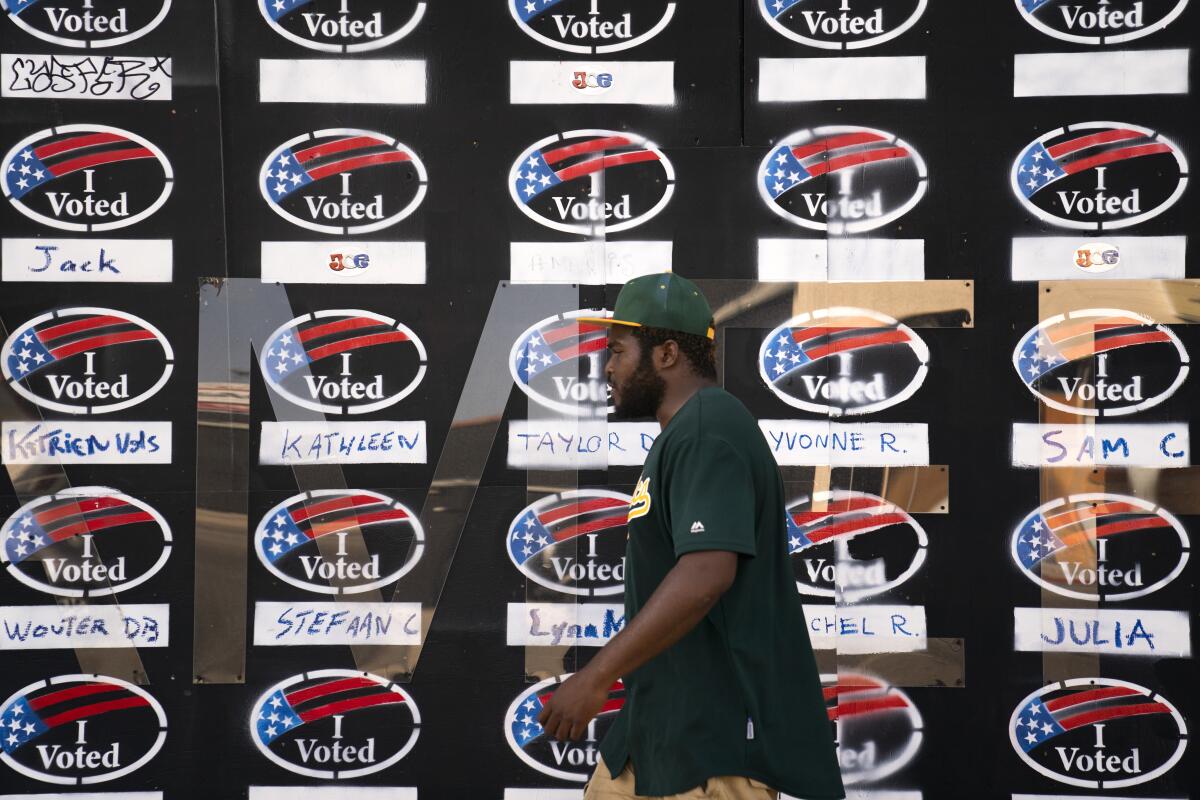Editorial: Big decisions for L.A. and California voters on the March 5 primary ballot

- Share via
Buckle up, California — the 2024 election season is underway. While the presidential contest will surely garner the most attention, many important state and local races and measures are also on the ballot.
If the start of the election season feels early this year, that’s because it is.
California moved its presidential primary from June to March starting in 2020, so the state could have more influence in choosing presidential contenders. Party nominations are typically locked up before the state’s usual primary date. Now California is one of more than a dozen states that hold their presidential primaries on March 5, or Super Tuesday.
History shows that fascists get more extreme with time. Anywhere they have come to power, they have done so through an electoral system, with support from a significant segment of voters, in alliance with conventional conservatives.
Alas, even with the earlier primary, California is unlikely to shape the presidential race this year. The Democratic nominee is expected to be Joe Biden. It’s possible the race for the Republican nomination could be competitive in March. But it’s also possible that Donald Trump will sweep California’s GOP primary. The Trump campaign pushed the California Republican Party last year to change its rules so that if a candidate wins more than 50% in the primary, he or she will win all 169 delegates, which is the most of any state.
The Times editorial board will begin publishing its endorsements this week. The board is part of the Opinion section and separate from the newsroom. We endorse selectively, choosing to focus on local and state races in which we can be the most helpful to our readers. For the March primary, those include city, county and Los Angeles Unified School District races, as well as a few particularly competitive congressional races. We also will make recommendations in the Los Angeles Superior Court judicial races, which are often the most baffling because the candidates are unfamiliar to most voters. We may endorse in additional races for the November general election.
The editorial board, which is part of the Opinion section and separate from the newsroom, endorses in select races. Here’s how we make our decisions.
California will choose a new U.S. senator this year to replace Dianne Feinstein, who died in September. She had held the seat since 1992. This high-profile race includes three members of the House — Barbara Lee, Katie Porter and Adam B. Schiff — and former Dodger Steve Garvey, who is running as a Republican. More than two dozen candidates made the ballot, but it could become a Democrat-versus-Democrat runoff with the state’s top-two primary system.
Another closely watched race is the contest for Los Angeles County district attorney. Running as a progressive prosecutor four years ago, George Gascón ousted incumbent Dist. Atty. Jackie Lacey. But Gascón’s term hasn’t been easy. From Day One, critics inside and outside the office have attempted to block his attempts to address the historical inequities and excesses of the justice system. He survived two recall attempts, but now faces 11 challengers. The race is seen as another test of Los Angeles’ and California’s commitment to criminal justice reform.
There is only one statewide measure on the ballot: Proposition 1, a significant overhaul of the state’s mental health system. Spearheaded by Gov. Gavin Newsom, the measure includes a $6.4-billion bond that would pay for the construction of new inpatient and outpatient facilities for people in need of mental health and substance abuse treatment. It would also redirect mental health funding from a previous tax measure to provide more housing and services to homeless people with mental health or substance abuse disorders.
This year election season offers a rare and bracing change with more competitive state and local races than in the recent past, giving and voters a choice of more than one qualified candidate. Our endorsements reflect that.
And in Los Angeles, there are seven City Council seats up for election, including some significant challenges to incumbents. Sitting council members had pretty easy reelection races until L.A. voters decided in 2015 to move the city’s elections to coincide with higher turnout presidential and gubernatorial elections. In 2020 and 2022, several incumbents were ousted in elections that draw a larger and more diverse electorate. We’ll see if that continues in 2024.
For the last three months, the editorial board has been interviewing candidates and doing research and reporting to inform our recommendations. We look for individuals who have a record of success, demonstrated leadership qualities and the ability to solve problems. We welcome your thoughts and feedback. Look for Times endorsements in the print edition and online.
More to Read
A cure for the common opinion
Get thought-provoking perspectives with our weekly newsletter.
You may occasionally receive promotional content from the Los Angeles Times.












